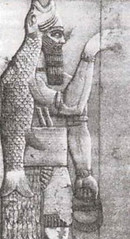
As a contributor to The Resurrection of Jesus William Lane Craig attempts to tidy up some looseness in the arguments for the resurrection of Jesus made by N. T. Wright in his voluminous opus, The Resurrection of the Son of God.
I quote here Craig’s recasting of Wright’s argument in a “more perspicuous” structure. He precedes his recasting with this:
[A]ttempts to explain the empty tomb and postmortem appearances apart from the resurrection of Jesus are hopeless. That is precisely why skeptics like Crossan have to row against the current of scholarship in denying facts like the burial and empty tomb. Once these are admitted, no plausible naturalistic explanation of the facts can be given.
He then presents the freshly polished argument: Continue reading “The Best Argument for the Resurrection of Jesus (as good as an argument for the lost civilization of Atlantis)”

